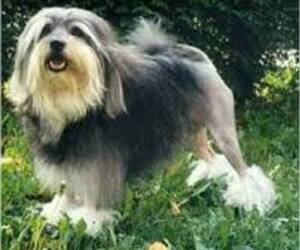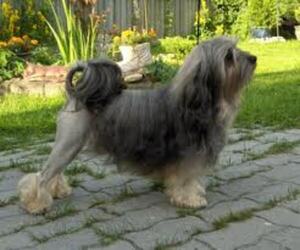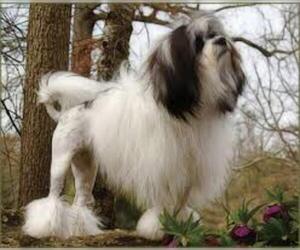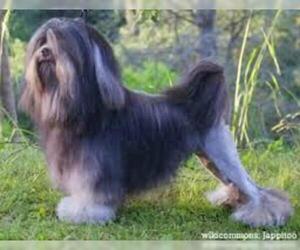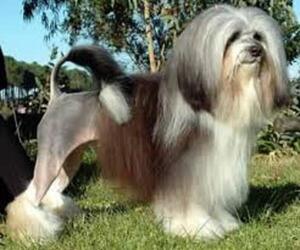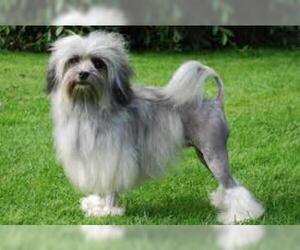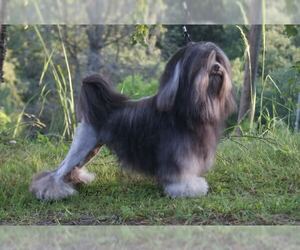
All about Lowchen dog breed
A.K.A. :Little Lion Dog, Lion Dog, Petit chien lion, Löwchen, Løwchen, Löwenmensch, Leuwenhondje, Leoncito, Le Petit Chien Lion
Size
Grooming requirements
Exercise requirements
Good with other dogs
Watchdog ability
Energetic
Training requirements
Playful
Affectionate
Good with other pets
Good with children
Good with strangers
Winter
Summer
Healthiness
Protective
Life Span
| Pure Breeds | Member |
| Breeds A - Z | L |
| Breeds by Group | Companion Non-Sporting |
| Breeds by Trait | Good With Kids Hypoallergenic Low Shedding Smartest Dog Breeds |
| Overview: | The Lowchen, or "Little Lion Dog," is a charming and distinctive breed with a rich history dating back to the Renaissance in Europe, where they were beloved companions to nobility. They are easily recognized by their unique lion clip, though they possess a naturally long, flowing coat that is soft and wavy, requiring regular grooming to prevent matting. Physically, Lowchen are small but sturdy, typically weighing between 9-18 pounds and standing around 12-14 inches tall. Their temperament is a delightful blend of playful enthusiasm and gentle affection, making them wonderful family pets. They are intelligent, eager to please, and adaptable, thriving in both larger homes and apartment settings as long as they receive adequate exercise and mental stimulation. Generally robust, the Lowchen is a relatively healthy breed, though some lines may be predisposed to certain conditions like patellar luxation or progressive retinal atrophy, making responsible breeding and regular veterinary check-ups important. Their affectionate nature and lively spirit make them a delightful addition to many households. |
F.A.Q.
All You Need to Know About the Lowchen Breed
The Lowchen, often called the "Little Lion Dog," is a charming and spirited companion originating from Europe, renowned for its distinctive lion-cut groom. These small, sturdy dogs boast a joyful and affectionate temperament, making them excellent family pets that thrive on human interaction. Their intelligence and eagerness to please make them relatively easy to train, and they generally get along well with children and other pets. With their compact size, typically weighing between 10-18 pounds, Lowchens are well-suited for apartment living, provided they receive daily walks and playtime to burn off energy. Their beautiful, single coat is low-shedding, making them a good choice for those with mild allergies, but requires regular brushing and professional grooming every 4-6 weeks to prevent matting. While generally healthy, potential owners should be aware of common health considerations such as patellar luxation and eye conditions. If you're seeking a lively, devoted, and relatively low-maintenance companion, the Lowchen might be your perfect match!Lowchen Weight: Average Size & Healthy Range
The average healthy weight for an adult Lowchen is generally 12-18 pounds. While there isn't a significant weight difference between males and females, individual Lowchen weight can vary slightly within this range. This average size makes them a compact and manageable companion.Wondering about the Lowchen height or how tall is a Lowchen? These charming "Little Lion Dogs" are known for their compact and sturdy build. The average size of a Lowchen, measured at the shoulder, typically falls between 12 to 14 inches (30-36 cm).
While this is the general range, you might see slight variations. Generally, there isn't a significant difference in height between male and female Lowchens; both sexes tend to mature within this 12-14 inch window. However, like all breeds, individual genetics can play a role, meaning some Lowchens might be at the lower end of the range, while others might reach the upper end.Rest assured, a Lowchen's moderate height makes them a very manageable and adaptable companion for various living situations!The Lowchen, or Little Lion Dog, comes in a wide array of colors, making it a visually diverse breed. AKC recognized Lowchen colors include black, cream, fawn, gold, parti-color (two or more colors), red, silver, and white. Brindle patterns, along with sable and various shades of brown (chocolate, liver), are also commonly seen and accepted. These are the standard and most sought-after Lowchen colors for show and breeding.While not officially recognized by major kennel clubs like the AKC, some breeders may occasionally produce rare coat types or exotic Lowchen variations such as blue (a dilute black), lilac (a dilute chocolate), or merle. These colors are considered outside the breed standard and are often associated with specific genetic lines. Potential buyers should be aware that such exotic Lowchen variations may come with different pricing and are not typically seen in the show ring. Always prioritize reputable breeders who focus on health and temperament, regardless of the specific Lowchen colors offered.
Lowchen Personality & Temperament: The Lowchen, also known as the "Little Lion Dog," is a delightful and affectionate companion. They possess a friendly and outgoing nature, making them excellent family pets. Loyalty is a hallmark of the breed; they form strong bonds with their human companions and thrive on being part of the action. These intelligent dogs are highly sociable and generally get along well with everyone, including strangers, other dogs, and even cats when properly introduced. Their adaptability to apartment living is a major plus, provided they receive regular walks and mental stimulation. With children, Lowchen are typically patient and playful, making them wonderful companions for respectful kids. Their "little lion" spirit is more about their charming looks than a fierce disposition. They are generally eager to please, making training a rewarding experience. The Lowchen's temperament is best described as cheerful, loving, and engaging.
The Lowchen temperament is renowned for its outgoing and cheerful nature, making it an excellent companion dog. They are highly sociable and thrive on human interaction, displaying unwavering loyalty to their families. Generally very friendly, Lowchens adapt well to various living situations, including apartment living, provided they receive adequate exercise and mental stimulation.They typically have a playful and affectionate demeanor with children, especially if raised with them and taught proper interaction. Their sociability extends to other pets, often getting along well with other dogs and cats. While generally eager to please, Lowchens can exhibit a tendency towards stubbornness if not properly motivated or if they perceive an inconsistency in training. They are also known to be sensitive to harsh corrections, responding best to positive reinforcement and gentle guidance. This breed’s personality traits make them a delightful and engaging member of the family.
Lowchen Care: Daily Maintenance for a Happy Companion
Caring for a Lowchen, also known as a "Little Lion Dog," involves several key aspects to ensure their health and happiness. These charming dogs have specific needs that potential owners should be aware of.Grooming Needs: Lowchen care primarily revolves around their distinctive coat. They have a long, flowing double coat that requires regular attention. To prevent mats and tangles, daily or every-other-day brushing is essential. Many owners opt for professional grooming every 4-6 weeks to maintain the traditional "lion cut," which involves clipping the hindquarters short while leaving the mane, tail, and front legs long. Regular nail trims and occasional bathing are also part of their routine grooming.Exercise Limitations & Brachycephalic Anatomy: The Lowchen is a relatively low-energy dog breed, making them suitable for various living situations. Daily short walks (20-30 minutes) and indoor playtime are generally sufficient to meet their exercise needs. Due to their brachycephalic (short-nosed) anatomy, Lowchens can be sensitive to extreme temperatures. It's crucial to avoid strenuous exercise in hot, humid weather and to monitor them closely for signs of overheating. They thrive best in moderate climates and should always have access to shade and fresh water during outdoor activities.Dietary Considerations & Weight Management: Providing a high-quality, balanced diet appropriate for their age, size, and activity level is vital. Consult your veterinarian for specific dietary recommendations. Lowchens can be prone to weight gain if overfed or under-exercised, so careful portion control and regular monitoring of their body condition are important for effective weight management. Obesity can exacerbate other health issues.Wrinkle and Ear Cleaning: While Lowchens typically have fewer facial wrinkles than some other brachycephalic breeds, regular cleaning of any skin folds (if present) is important to prevent irritation and infection. Their floppy ears should be checked weekly and cleaned as needed to prevent wax buildup and ear infections. Use a veterinarian-approved ear cleaner and cotton balls.Common Health Concerns & Dental Care: Like all breeds, Lowchens can be prone to certain health issues. Common health tips for Lowchen owners include being aware of potential skin issues, allergies, and patellar luxation. Dental care is paramount for this breed; daily brushing with canine-specific toothpaste is highly recommended to prevent plaque buildup, gum disease, and tooth decay. Regular veterinary check-ups, including dental examinations, are crucial for early detection and treatment of any health problems.In summary, how to care for a Lowchen involves consistent grooming, appropriate exercise, a balanced diet, and proactive health management. With proper daily maintenance, your Lowchen will be a healthy, happy, and long-lived companion.The Lowchen activity level is moderate. They possess surprising bursts of energy for their size but are also content to relax for long periods, making them adaptable to various household energy levels.How active are Lowchen?They are generally playful and enjoy interactive games with their families, thriving on attention and mental stimulation. Daily Lowchen exercise needs include a couple of short walks (15-20 minutes each) and dedicated playtime indoors or in a securely fenced yard. They are not built for endurance and are known to "play hard, nap hard."Limitations due to Brachycephalic Anatomy:Due to their brachycephalic (short-nosed) structure, Lowchen can be prone to overheating and respiratory difficulties, especially in warm weather or during strenuous activity. It's crucial to avoid over-exercising them in heat and always provide fresh water and a cool resting place. They are not suited for long-distance running or intense outdoor sports.Suitability:Lowchen strike a good balance, making them suitable for both families who enjoy moderate activity and those seeking a companion for a more relaxed lifestyle. They are more than happy to participate in gentle strolls and playtime but are equally content to cuddle on the couch. While they can keep up with active families for short bursts, their primary need is companionship and engaging, but not overly strenuous, activities.
Breed Breakdown: What Experts Say About the Lowchen
I would rate the Lowchen's "Size" trait a 3.The Lowchen is undeniably a small breed. They typically stand between 12 to 14 inches tall and weigh between 13 to 18 pounds. Their body structure is compact and sturdy, but they are far from being considered even medium-sized. When compared to other companion dogs, they fall squarely into the small to toy breed category, being significantly smaller than a Cocker Spaniel or Beagle, and dwarfed by breeds like a Golden Retriever. This diminutive size makes the Lowchen exceptionally well-suited for apartment living, frequent travel, and households with limited space. Their modest physical dimensions are a defining characteristic, emphasizing their role as a portable and adaptable companion.
The Lowchen breed rates a 9 out of 10 for grooming requirements, making them a very high-maintenance breed. While they are known for being non-shedding, which is a plus for allergy sufferers, this comes with the significant responsibility of a constantly growing coat that needs diligent attention. Their long, soft, and somewhat wavy double coat is highly prone to matting and tangling if not brushed daily. This isn't just a quick once-over; it requires thorough brushing to prevent mats from forming close to the skin, which can be painful and lead to skin infections. Beyond daily brushing, professional grooming or extensive home grooming every 4-6 weeks is essential for trimming and shaping their coat, especially if you opt for the traditional "lion cut." Ear cleaning is routine, and nail trimming is frequent, as with most active dogs. While they aren't particularly prone to skin fold issues due to their body structure, their dense coat can hide skin problems if not regularly inspected. Their bathing needs are moderate, typically every few weeks, but this must be followed by careful drying and brushing to prevent tangles. Compared to other companion dogs, the Lowchen demands significantly more frequent and specialized grooming to maintain their coat health and prevent discomfort, making them far from an easy-care breed in this regard.
I would rate the Lowchen's "Exercise Requirements" at a 6.The Lowchen is a lively and playful breed, but not one that demands extreme physical exertion. They possess a good amount of energy for their size, enjoying daily walks and active playtime, which is crucial for their mental and physical well-being. While they are brachycephalic, their snout is generally not as severely flattened as some other breeds, allowing them a bit more tolerance for sustained movement without significant respiratory distress, provided it's not in extreme heat or humidity. They thrive on regular, moderate activity like a couple of brisk 20-30 minute walks a day, combined with indoor games or a fenced yard for running around. They are intelligent and can excel in activities like obedience or even beginner agility, which provides excellent mental stimulation. However, they aren't marathon runners and won't be content with just lying on the couch all day; they need structured routines to stay healthy and prevent boredom, which can lead to unwanted behaviors. They enjoy being active participants in family life rather than just observers, but their needs are well within the grasp of most active families without requiring an intense exercise regimen.
I'd rate the Lowchen's "Watchdog Ability" at a 7 out of 10.While not a guard dog in the true sense, the Lowchen possesses a surprisingly effective watchdog ability for its size. They are remarkably alert to their surroundings, quickly picking up on unfamiliar sounds, the arrival of new people, or anything out of the ordinary. This alertness often manifests in a sharp, somewhat yappy bark, which serves as a clear and immediate warning to their owners. They have a good sense of their territory (their home) and will vocalize their disapproval of anything they perceive as an intrusion. While they aren't likely to physically deter an intruder, their persistent barking and noticeable presence are more than capable of providing meaningful early warnings in a home environment, alerting owners to potential threats and potentially even startling away casual intruders. They are definitely not a passive companion in this regard; they are actively engaged with their environment and will make their presence known when something isn't right.
I would rate the Lowchen's "Good with Other Dogs" trait a 9 out of 10.The Lowchen is generally an extremely sociable and dog-friendly breed. They typically display a joyful and playful demeanor around unfamiliar dogs, often initiating gentle play bows or tail wags. Their small size doesn't deter them from interacting with larger breeds, and their adaptable nature allows them to get along well with dogs of various energy levels, often matching their play style to their canine companion. While early socialization is beneficial for any breed, the Lowchen's inherent good nature means they usually take to other dogs with ease, even with less intensive socialization compared to some other breeds. They are not typically prone to aggression or dominance; instead, they thrive on companionship and are known for their desire to be part of a "pack," whether human or canine. This makes them exceptionally well-suited for multi-dog households, where they often flourish and enjoy the constant company. While careful introductions are always a good practice when bringing any new dog into a home, a Lowchen is far more likely to welcome a new canine friend than to present significant challenges.
I would rate the Lowchen's "Energetic" trait a 6 out of 10.While the Lowchen is often described as a lively and playful companion, it's not an inherently high-energy breed in the same vein as a Border Collie or a Jack Russell Terrier. They possess a good amount of energy for indoor play and are always up for a game of fetch or a romp in the yard, displaying a charming playfulness that can last for reasonable periods. Their endurance is moderate; they enjoy walks and can keep up for a decent stroll, but they aren't built for long-distance running or intense, sustained athletic activities. They do require regular physical stimulation to prevent boredom and maintain their cheerful disposition, but this can often be met with daily walks and engaging playtime.Compared to many other companion dogs, they fall somewhere in the middle – more active than a truly sedentary breed like a Bulldog, but more laid-back than a high-octane terrier. Their brachycephalic (short-nosed) anatomy, though not as extreme as some other breeds, does somewhat affect their stamina and exercise tolerance. This respiratory structure means they can overheat more easily and have a harder time breathing during strenuous or prolonged activity, especially in warm weather. Therefore, while they enjoy being active, their exercise needs must be managed thoughtfully, avoiding overexertion to ensure their comfort and health. They are more sprinters of play than marathon runners.
I would rate the Lowchen's "Training Requirements" at a 6.While intelligent and eager to please their beloved people, Lowchens aren't always a walk in the park when it comes to training. They can possess a charmingly independent streak and a "what's in it for me?" attitude, leading to occasional stubbornness. Their attention span, especially as puppies, can be short, requiring frequent, brief, and engaging training sessions. They respond beautifully to positive reinforcement – treats, praise, and play – but harsh methods will quickly shut them down and make them resistant. Consistency is absolutely key; if you let rules slide, they will exploit the loophole.They are generally beginner-friendly if the owner is committed to consistent, positive, and patient training. However, they are not a breed that can be left to their own devices; they thrive on structured routines and clear expectations. An experienced handler might find it easier to navigate their occasional stubbornness and maintain that crucial consistency, but a dedicated novice can certainly succeed with this intelligent and loving breed.
I would rate the Lowchen's "Playful" trait an 8 out of 10.Lowchens are naturally spirited and genuinely enjoy being part of the fun. They possess a delightful zest for life and thrive on interaction with their human companions. While not hyperactive, their typical activity level is quite good, and they are always up for a game or a cuddle. They exhibit a strong love for games, often initiating play with a charming nudge or a playful bark, and respond enthusiastically to toys. They are definitely attention-seeking in a charming, not demanding, way, wanting to be involved in whatever their family is doing. Their overall enthusiasm in daily life is high, often expressed through their wagging tails and bright eyes. Compared to some more laid-back companion breeds, the Lowchen is notably more energetic and eager to engage, making them a consistently fun and engaging companion.
I'd rate the "Affectionate" trait of the Lowchen at a strong 9.The Lowchen is exceptionally loving and people-oriented, truly thriving on human companionship. They are renowned for their desire for physical closeness, often seeking out laps to sit on and snuggling up for cuddles. This breed exhibits a deep loyalty to their families, frequently described as "velcro dogs" due to their tendency to follow their owners from room to room. They are also highly sensitive to the emotions of their people, offering comfort when sensing distress. While they possess a playful and mischievous spirit, their core desire is to be an integral, cherished member of the family, making them far from independent when it comes to emotional connection. They genuinely crave and flourish with abundant affection.
I would rate the Lowchen's "Good with Other Pets" trait as an 8 out of 10.Lowchens are generally known for their outgoing and affectionate personalities, and this often extends to other animals. They typically get along well with other dogs, especially if introduced properly and socialized from a young age. Their prey drive is usually moderate to low, meaning they aren't generally inclined to chase or harm smaller pets like cats, particularly if they've been raised alongside them. Resource guarding tendencies are not a prominent characteristic of the breed, though like any dog, individual variations can occur and proper training is always beneficial. They are adaptable and thrive on companionship, making them good candidates for multi-pet households. While naturally sociable, early socialization and continued positive interactions are crucial to ensure they remain polite and comfortable around all types of other pets. Supervision during initial introductions is always recommended, but with a good foundation, Lowchens are typically easy-going and can coexist peacefully and even form strong bonds with their furry housemates.
Rating: 9Explanation: The Lowchen is exceptionally good with children, earning a high rating due to its naturally affectionate, playful, and gentle temperament. They are often described as "little lions" with hearts of gold, displaying remarkable patience and a high tolerance for the noise and handling that come with active children. Their sturdy build for a small dog makes them less fragile than some other toy breeds, and their desire to be involved in family activities means they thrive on the energy and attention children provide. While basic obedience training is always beneficial for any dog, the Lowchen's inherent good nature means they are generally very adaptable and affectionate with kids, requiring less specific "kid-proofing" training than some breeds to thrive in a family setting. Supervision is always recommended with any pet and young children, but the Lowchen's natural inclination towards gentleness and their love for companionship make them outstanding companions for families with children of various ages.
The Lowchen's "Good with Strangers" trait rates a solid 7 out of 10. These charming little dogs are generally quite sociable and welcoming, a natural characteristic that contributes to their "little lion" persona, as they often approach new people with a confident curiosity rather than timidity. While they aren't typically reserved or unfriendly, their initial interaction might involve a moment of assessment, not aggression. They are less likely to be overly barky or intensely guarding compared to some other breeds, preferring to engage rather than deter. Their adaptable nature means they usually fare well in public or guest-filled environments, often enjoying the attention. While they are naturally outgoing, early and consistent socialization certainly reinforces their comfort and politeness with unfamiliar adults, ensuring their innate friendliness shines through without any shyness.
The Lowchen breed's "Winter" tolerance can be rated around a 4 out of 10. While their long, flowing coat provides some insulation, it's a single layer without an insulating undercoat, making it less effective against significant cold. They are a small breed with relatively low body fat, meaning they lose heat quickly. Their non-brachycephalic anatomy is a plus, allowing for more efficient respiration, but it doesn't outweigh their other vulnerabilities. They are at a moderate risk of hypothermia in prolonged or very cold exposure.For these reasons, Lowchens absolutely require special care during winter months compared to many other companion dogs. They are not built for prolonged outdoor activity in cold climates and should not be left unsupervised in chilly temperatures. They will benefit significantly from sweaters or coats for walks, and their outdoor time should be limited to short potty breaks when the weather is truly cold. Owners in very cold regions might consider indoor potty options or heated enclosures for brief outdoor stints to ensure their comfort and safety.
The Lowchen breed has a "Summer" tolerance rating of 3.While not as severely brachycephalic as some breeds, the Lowchen does possess a shorter snout compared to dolichocephalic (long-nosed) breeds. This anatomical feature, even in a milder form, can impede efficient heat dissipation, making them more susceptible to overheating. Their small size and often playful nature can also lead to overexertion if not monitored. Lowchens are not naturally equipped to regulate their body temperature effectively in high heat. They are at a heightened risk of heatstroke, and outdoor activity during hot weather should be significantly restricted to early mornings or late evenings when temperatures are cooler. During peak summer months, they absolutely require climate control, such as air conditioning, to prevent overheating. Compared to many other companion dogs, the Lowchen requires special care in summer months, including strict avoidance of midday heat, constant access to fresh water, and a cool indoor environment, to safeguard their health.
I would rate the Lowchen's "Healthiness" trait as an 8 out of 10.The Lowchen is generally considered a robust and healthy breed, particularly when compared to many other small companion dogs. They boast a respectable life expectancy of 12-15 years, which speaks to their overall good health. While no breed is entirely free from health concerns, the Lowchen doesn't suffer from the severe or widespread issues seen in some highly modified or brachycephalic breeds. They are not typically prone to significant breathing difficulties, and serious joint problems like severe hip or elbow dysplasia are less common than in larger breeds. Some breed-specific concerns exist, such as patellar luxation, certain eye conditions (like Progressive Retinal Atrophy), and occasionally Legg-Calve-Perthes disease, but responsible breeders actively screen for these conditions, significantly reducing their prevalence. Skin conditions are not a prominent characteristic of the breed either. With responsible breeding practices focusing on health clearances and preventive veterinary care, the Lowchen can lead a very healthy and active life. They are not considered a high-maintenance breed in terms of health, generally requiring routine veterinary check-ups and a balanced lifestyle rather than specialized care for chronic conditions.
I would rate the Lowchen's "Protective" trait at a 6 out of 10.The Lowchen is an alert and vocal breed, making them excellent little watchdogs. They are quick to notice and announce the presence of strangers or unusual sounds, demonstrating good alertness and a degree of territorial instinct within their home. Their loyalty to their owners is unwavering, and they will certainly bark to alert their human companions to potential threats. However, their small size and generally friendly disposition mean they are not physically capable of offering meaningful protection as a guard dog. While they will bravely stand their ground and bark, they are more likely to greet a perceived intruder with a wagging tail once they realize there's no actual danger, rather than posing a physical threat. They excel at raising an alarm and deterring minor disturbances, but they are fundamentally a companion dog, and their protective instincts primarily manifest as vocal warnings rather than physical defense.
I would rate the Lowchen's "Life Span" trait a 9 out of 10.The Lowchen is renowned for its exceptional longevity, often living well into its mid-to-late teens, with many individuals surpassing 15 years and some even reaching 18 or beyond. This makes them a definitively long-lived breed compared to most other companion dogs. While no breed is entirely free of health concerns, the Lowchen generally boasts a robust constitution. Common health issues, such as patellar luxation or progressive retinal atrophy, are often manageable with early diagnosis and can be significantly mitigated through responsible breeding practices that screen for these genetic predispositions. Dedicated care, including a balanced diet, regular exercise, and preventative veterinary check-ups, further contributes to their extended lifespan. Their relatively low incidence of complex or rapidly progressive diseases compared to many other breeds solidifies their standing as a breed with remarkable longevity.
Lowchen Dogs for adoptionSee all dogs for adoption
Lowchen BreedersSee all breeders
Similar Dog Breeds for Lowchen
Breed Mixes of Lowchen
Quick Breed Selector 0 - not important, 1 - smallest, 10 - largest
Variants & Mistakes :Louchen, Lochun, Louchin, Lowchin, Lochin, Lowchan, Louchan, Lochan, Lowchon, Louchon, Lochon, Loucin, Locin, Loucan, Locan, Loucon, Locon, Lowchein, Louchein, Lochein, Lowchian, Louchian, Lochian, Lowcheon, Loucheon, Locheon, Lowchoin, Louchoin, Lochoiin, Lowchonn, Louchonn, Lochonn, Lowchn, Louchn, Lochn, Lowchenn, Louchenn, Lochenn, Lochen
